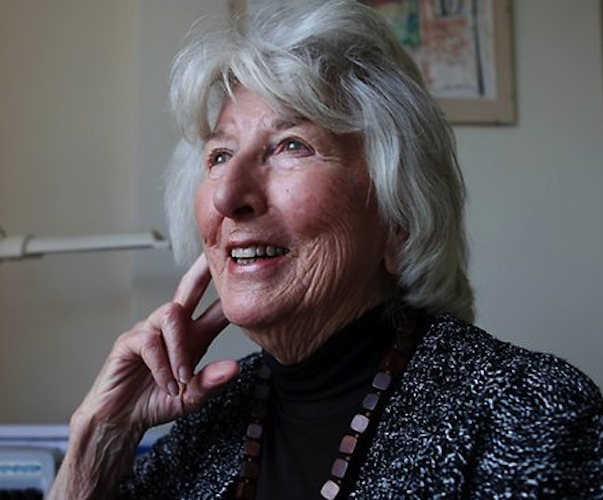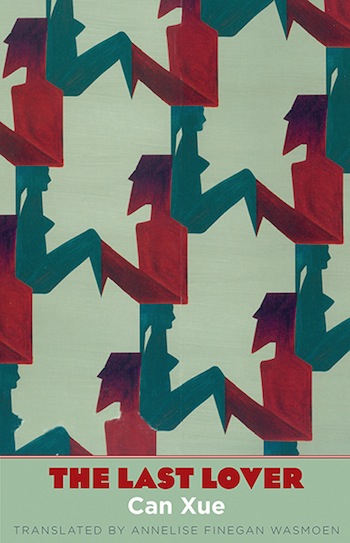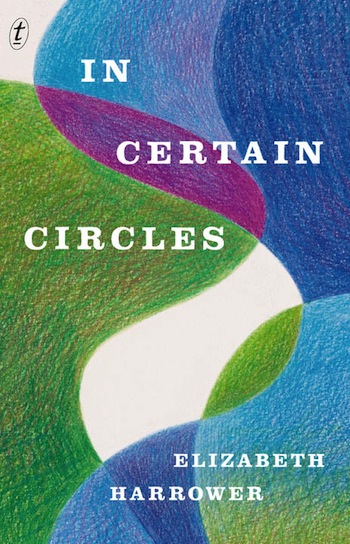Book Review: “In Certain Circles” and “The Last Lover” — The Powerful and The Disappointing
Elizabeth Harrower’s In Certain Circles is a stunning novel about class and marriage and power; Can Xue’s The Last Lover is a tedious surrealistic farce.
In Certain Circles, Elizabeth Harrower, Text Publishing, 252 pages, $29.99 and The Last Lover, by Can Xue. Translated by Annelise Finegan Wasmoen. Yale University Press, The Margellos World Republic of Letters, 336 pages, $16.
By Roberta Silman
From halfway around the world come two novels by females with interesting back stories and very different results. Can Xue is the pseudonym of a Chinese woman named Deng Xiaohua who made her living as a tailor and started writing fiction in 1983. She is the author of six earlier books available in translation, the majority of them collections of stories and novellas. Can Xue is very well-regarded in her native land (and beginning to acquire a bit of a reputation internationally), though The Last Lover is only her second novel to be published in English. Elizabeth Harrower is an Australian writer born in 1928 who wrote four very well-received novels and then abruptly withdrew In Certain Circles just before it was about to be published in 1971. She continued to write short fiction but has not published anything since.
I will start with the less important of these, The Last Lover, a novel packed with numerous anxiety-ridden characters who live in an unnamed country that is part of the Western world and seem able to step into each others’ dreams and fantasies. These figures are all troubled in some basic way and their inner lives seem over-populated with all sorts of wild animals (snakes, birds, cats, mice, wasps), natural disasters (landslides and earthquakes), and an overwhelming preoccupation with sex (how desire and the sexual act intersect and what desire can wreak on those who have a generous portion of it).
Can Xue has been compared to Kafka, and as you read along you can see that she has read her Kafka, but there is none of that writer’s magic in this novel. I suspect her stories, which are more popular, may be better simply because they have to be shorter and sharper. This novel shows none of the extreme care that Kafka took with language, an obsession with words that you can sense even in translation; nor is there anything like Kafka’s amazing imagination: his ability to create such startling images and tales from the bourgeois Jewish Prague in which he lived. After a while I stopped looking for anything that might resemble Kafka, and let myself be carried along by Xue’s story, which seemed more and more like a farce, nothing nearly as good as Oscar Wilde or Michael Frayn’s Noises Off but with some of the frenetic energy that often makes the genre so hilarious. However, Can Xue has almost no sense of humor, so although I would have been happy to read about Chinese counterparts of Lucy and Desi or Ralph Kramden and Alice, there wasn’t that, either. All of The Last Lover‘s surreal detail eventually came together, but that didn’t make the reading any less tedious.
The novel goes on too long, has too many red herrings in the form of peripheral characters, and makes people behave in ways that are hard to believe. It also seems sophomoric in its emphasis on the wonders of sex. The truth is that I gave up after about half of the book, thought about it, was encouraged by Arts Fuse editor Bill Marx to read some more because “she has a big reputation in China,” and was defeated again. In my defense, I will say that a book with so much detail (every stitch is accounted for, to use the tailor analogy) is not what I expected from a contemporary Asian writer, because one of the things that so appealed to me when I read Kawabata and Mishima when I was young was the spareness that gave their novels such mystery and appeal.
It is exactly that kind of spareness that distinguishes Elizabeth Harrower’s work. In Certain Circles is a powerful novel about class and marriage and power, reminiscent of E.M. Forster’s Howard’s End, and written in exquisite prose comparable to that of Patrick White and Virginia Woolf. Moreover, her characters are so vivid that you see them before you, and as I read I had the uncanny sensation that I was watching a terrific play. But the good thing about a novel is that it isn’t a performance and you can go back and re-read and enjoy this kind of prose all over again.
In Certain Circles is about two sets of siblings. The first are Russell and Zoe Howard, who live on the posh north side of Sydney harbor, who are privileged and well-educated and cherished by their parents, who are both biologists and
well-known identities. . . .They had travelled. They were invited to join public discussion groups. They were interviewed and photographed, and were on the list of those whose opinions on every subject from crime to mayonnaise were expected to be of interest to the whole city.
The other pair are Stephen and Anna Quayle whose parents were killed in a car accident when
Stephen was seven or eight, and Anna a few months old. . . .After the accident, the Quayle children were taken in by their mother’s brother. . . . Charles Boyd was as concerned for his two wards as any childless man with a neurasthenic wife could be expected to be. He hoped the children would be an interest for Nicole , and improve her state of mind. . . . There was always some helper in the house. . . but none stayed long. [Nicole’s] melancholy and her moods had cowed him. He longed for peace, gave her her way, and had no peace. . . . Nicole was very strange, if thwarted. . . .[Stephen] and his sister learned to be silent within miles of their aunt. They were obliged to think about her constantly, because it seemed that their survival depended on it.
Just as the Sydney landscape is described with swift, yet telling strokes, these characters are brought alive by Harrower’s precision, her love of them — with all their strengths and flaws — and a sly wit which never fails to hit the mark.
The Quayles have grown up powerless, not knowing all sorts of things that Russell and Zoe take for granted. Russell is fascinated by Stephen’s otherness; Zoe has to work hard not to be repelled by Anna’s lack of confidence and timidity, even the fact that she had no idea “what suited her” in clothes. They all meet because Russell, who was a prisoner of war during what seems to have been World War II (though nothing is stated), is getting married to Lily, and Stephen, whom he met on a train and who fascinates him, is to be his best man. Everyone adores Russell, who seems able to see beneath the surface of things and who is always cheerful despite having survived a childhood swimming accident that took his two good friends to early deaths. Now, though, this somewhat pathetic pair is in the Howard home several weeks before the wedding, presumably so they can all get to know each other, and the best that Zoe’s mother can do is suggest to Zoe that she offer Anna some clothing she no longer wears.
What is so interesting about this book and these characters is the heightened awareness of class in a country that I always thought was settled by very ordinary folk, many of them descendants of the original prisoners who came from the United Kingdom in its heyday. Thus, In Certain Circles, with its very apt title, concentrates intensely on these two families, and in so doing becomes a meditation on “the other,” the differences among people and how opposites attract and are sometimes repelled by their inability to change each other.
Like a play, the book has three parts and is mostly made up of conversation. Back stories are told while lying on the beach or driving in a car and the narrative moves from one head to another in the third person with amazing ease. After being drawn into these conversations, the reader understands all he needs to know. Or thinks he does. But like all good narratives, this one twists and turns in surprising ways. The only foil to the third person narrative is Anna’s journal, which seems absolutely right since she becomes the lynchpin on which the novel eventually turns. Here is Anna writing about her new friendship with Zoe in the first part:
Zoe came in on her way home last night. . . . Next year when she graduates, she is going to Paris. I told her I had read in a paper at work that she has a brilliant future. Zoe laughed. ‘How would they know?’ she said. She has told me about two different opportunities. . . .They have seen her work, or heard of her somehow. She will be an assistant. One of them is famous. What I can’t understand is how they all knew about each other in the first place. Paris is so far away, and so many people must want these jobs. Zoe said they know about each other through friends.
[I said,] ‘Everyone seems to be your family’s friend.’
When I said this once before, years ago, to Zoe, she looked taken aback. ‘But it’s the same for you,’ she said. ‘We all know each other. The world really is quite a small place.’
‘Oh, no. Most of us don’t know anyone.’
Despite that Anna meets a man named David Clermont, a flute-player with some real money whom everyone likes and thinks suitable. So she has surpassed her own expectations, although her yearning for something else is what ends the first part.
Part Two centers around a family gathering for Mrs. Howard’s funeral. Zoe has come from Paris where she is a well-known photographer, working and having an affair with an even more well-known photographer who is unfortunately married, and named Joseph Stranger. She has been dubbed “a wild Australian girl” who has even parachuted into the Middle East war zone. Of course Russell and Lily are there, and so is Stephen Quayle, more assured and handsomer than she remembered. And Anna has been suddenly widowed at thirty-three.

Australian novelist Elizabeth Harrower — her novel “In Certain Circles” is fiction at its very best.
Zoe impulsively goes out in a boat when the sea is rough, almost drowns and is saved by Stephen whom she decides to marry, against everyone else’s best hunches. But she is drawn to Stephen, and here she is, looking at her life after being married for a while:
From riding the crest of the wave, from taming tigers, she has turned into this new thing–a suppliant, but a suppliant with a purpose: all to be well with Stephen. She had fallen through him into the universe, into her real self. Yet he was only free spasmodically, as though secret gaolers had him secretly imprisoned somewhere, releasing and confining and tormenting according to some erratic timetable of their own.
The jail metaphor is apt, and although Stephen and Russell are now in business together running a printery, there are increasing problems with both Zoe’s and Russell’s marriages which unfold dramatically in the third section. Lily is falling apart because her twin girls have gone to London for university, all is not entirely well between her and Russell, and the bond between the Howard children is growing even stronger. In the absence of her sometimes exasperating mother whom she nevertheless loved dearly, Zoe turns to her brother for advice:
Russell said, . . .‘He’s my closest friend, and your husband, and we both know he’s difficult. You knew that before you married him.’
Like flame along a fuse wire, indignation ran through Zoe’s mind and heart. Could he dare to criticise Stephen? Moving slightly away from him, she asked somehow punctiliously, ‘What does that mean?’
For a moment Russell regarded her–not the shadowed eyes, the painted face, the lovely, expensive-looking woman there for all to see, but the person she was and would be whatever her circumstances or age.
‘Difficult means difficult. How old was he when you married? Thirty-one? Thirty-two? What went before did too much damage ever to be reversed completely–his parents, that poor destructive woman the house revolved around. He experienced evil at an age when you probably couldn’t spell it. Then the sweating away at night for years to get his degree, and the isolation. It wouldn’t have affected everyone the same way, but it harmed him. It’s a cliché, and it’s a fact.’
‘Anna said something like that once–about evil. But she’s not difficult, and she had longer there.’…
‘No, but that’s not the point.’
‘What is the point then?’
‘That you’re always going to have to make allowances. By which I only mean–to remember all this.’
Thus Harrower inserts another layer into this already dense and fascinating book: the problem of good and evil which, in a marriage, usually translates to power and tyranny and frustration and disappointment.
Some readers may have problems with the final denouement which can seem contrived or absolutely true to life, depending on your point of view and your life. I found Anna’s mistake entirely believable, given the rushed, often harried lives we lead. When all is sorted out, you feel that the novel doesn’t entirely resolve, but opens up to more possibilities. Exactly as life often does after a momentous event occurs. Although things have changed drastically, Harrower has too much empathy for her characters to consign them to closed-off lives. At the end of this stunning book, you have the feeling that these intelligent people will somehow find their way, perhaps because they have risked so much to get where they are. This is fiction at its very best, and we should be enormously grateful to Text Press for bringing this buried treasure to light.
Roberta Silman is the author of a story collection, Blood Relations, now available as an ebook, three novels, Boundaries, The Dream Dredger, and Beginning the World Again, and a children’s book, Somebody Else’s Child. A recipient of Guggenheim and National Endowment for the Arts Fellowships, she has published reviews in The New York Times and The Boston Globe, and writes regularly for Arts Fuse. She can be reached at rsilman@verizon.net.
Tagged: Can-Xue, Elizabeth Harrower, In Certain Circles, The Last Lover, The Margellos World Republic of Letters



So nice to see a photograph of a woman, especially an older woman, that looks like a real person (and happy and bright) instead of a PR shot. Thanks.
A quick note about Can Xue. I have read some of her short stories and were impressed by them …. which made me want to have this novel reviewed. She is generating a considerable reputation internationally. Roberta’s verdict on The Last Lover isn’t surprising — Can Xue’s earlier novel, Five Spice Street (also from Yale University Press) was also dreamlike, experimental, and episodic.